June marked the 25th Anniversary of Gramercy! Thank you to our valued investors, trusted business partners and team members without whom this milestone could not have been reached. We are excited for the opportunities we see ahead, and look forward to continuing to deliver upon our mission to have a positive impact on the well-being of our clients, portfolio investments (and their communities) and our team members.
Contents
Market Overview
Macro Review
Declining UK inflation initially re-priced global rates lower. However, weekly U.S. initial jobless claims fell to 228k, which was the lowest in nine weeks and below expectations of 240k and sent U.S. Treasury yields higher. Continuing claims are a lagged indicator that are two weeks old, so the strength was ignored. This offset softer retail sales and industrial production earlier in the week. Needless to say, there was growing caution around earnings season after Tesla‘s shrinking profitability and Netflix’s revenue growth slowed. Russia also terminated the grain deal with Ukraine after the Kerch bridge was bombed. The Russians have re-deployed sea mines and stated that any cargo headed to Ukraine will be considered military and therefore a threat. The move triggered significant weakness in Kernel as a commodity exporter, with broader macro implications associated with wheat and corn prices spiking. Elsewhere, the PBoC kept Loan Prime Rates unchanged (1yr at 3.55% and 5yr at 4.20%) but retail sales were notably weak and prompted the sell-side to forecast another RRR cut in 3Q. The opposite was true out of Turkey. The CBRT hiked policy rates by 250 bps to 17.5%, although even with USD strength TRY remained below 27. Turkey continued to benefit from the $51 billion in pledged support from the UAE, which included $8.5 billion in Eurobonds (similar to what Qatar has done), then Germany’s Baebrock has put Turkey’s EU membership on the agenda. There was also further drama around the BRICS Summit, where South Africa’s Ramaphosa had said that Russia made it clear that the arrest of President Putin would be a declaration of war. Finally, next week ought to kick-off the EM cutting cycle with Chile. Expectations have increased with a policy cut almost seen as a done deal.
EM Credit Update
Emerging market sovereign credit (cash bonds) ended the week unchanged, with spreads virtually unchanged as well. Sovereign outperformers were Tunisia, Argentina and Suriname, while Pakistan, Zambia and Ukraine underperformed.
The Week Ahead
Federal Reserve, ECB and Bank of Japan will deliver interest rate verdicts. The former two are expected to hike, while the Bank of Japan is very much unlikely to scrap YCC, especially after a hot inflation print last Friday. The ECB statement will be key in assessing the commitment to a September hike. Elsewhere, U.S., UK and Euro-area PMIs are expected to remain soft, with equally soft GDP out of the U.S. and South Korea. EM interest rate decisions are due out of Chile (11.25%), Ghana (29.5%), Hungary (13%), Indonesia (5.75%) and Nigeria (18.5%). Chile’s BCCh are set to begin an easing policy with a 50 bps cut. Chile’s Central Bank has kept the policy rate unchanged at 11.25% since October 2022, although inflation has trended down to 7.6% in June. Finally, Brazil and Mexico are set to provide inflation updates, while Turkey’s Central Bank will revise its inflation forecast trajectory.
Highlights from emerging markets discussed below: China’s 2Q GDP missed expectations with mixed June high frequency data, Financial backing by President Erdogan’s Gulf Cooperation Council (GCC) friends allows continuation of lackluster monetary policy normalization and South Africa’s Central Bank (SARB) paused its rate hiking cycle after downside inflation surprise and recent rand rally.
Fixed Income
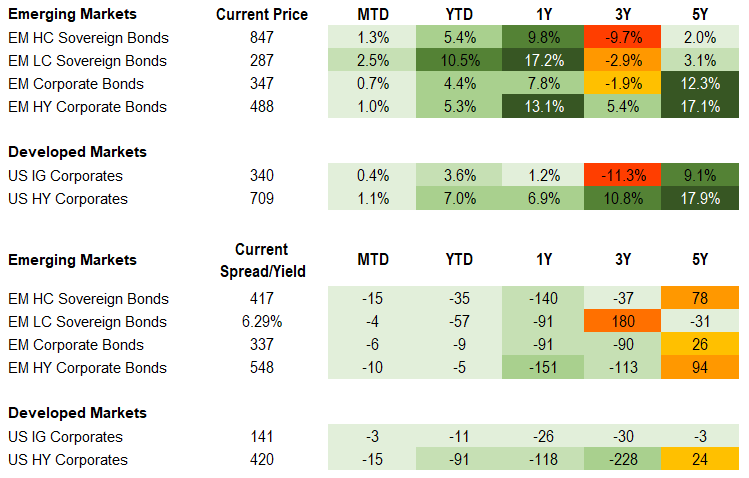
Equities
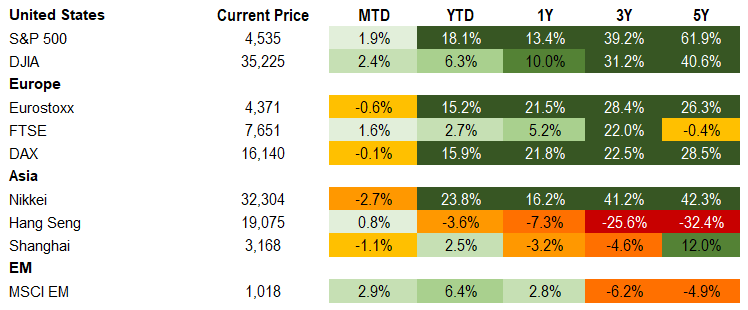
Commodities

Source for data tables: Bloomberg, JPMorgan, Gramercy. EM Fixed Income is represented by the following JPMorgan Indicies: EMBI Global, GBI-EM Global Diversified, CEMBI Broad Diversified and CEMBI Broad High Yield. DM Fixed Income is represented by the JPMorgan JULI Total Return Index and Domestic High Yield Index. Fixed Income, Equity and Commodity data is as of July 21, 2023 (mid-afternoon).
Emerging Markets Weekly Highlights
China’s 2Q GDP missed expectations with mixed June high frequency data
Event: China’s growth in the second quarter was 6.3% y/y, missing expectations by 80 bps. June retail sales growth was 20 bps below the consensus estimate at 3.1% y/y while industrial production and investment were stronger than forecasted at 4.4% y/y (vs. 2.5%) and 3.8% YTD (vs. 3.4%), respectively. On the heels of the recent data softness, previously more optimistic sell-side analysts have trimmed their 2023 growth forecasts closer to 5%. Later in the week, authorities issued a statement calling for improved business conditions, particularly more equal treatment of private and public enterprises including greater consultation with business owners and forthcoming additional measures for the private sector.
Gramercy commentary: We see the soft GDP print as supportive of the new easing measures in coordination with the upcoming Politburo meeting later this month. As previously outlined, we expect this to expand upon existing policies with room for additional fiscal, monetary, and property loosening albeit still moderate and targeted in scale and scope allowing authorities to near their 5% target. Thereafter, the focus will remain on high frequency activity data as well as prospects for more meaningful reforms and policy out of the Plenary session and financial work conference later this year.
Financial backing by President Erdogan’s Gulf Cooperation Council (GCC) friends allows continuation of lackluster monetary policy normalization
Event: The Central Bank of the Republic of Turkey (CBRT) increased its main policy rate by 250 bps to 17.5% this week. Meanwhile, President Erdogan’s first post-election official trip to the Gulf produced agreements that could provide material external financing for the Turkish economy in the near-term, including FDI deals worth up to $50 billion and potential investments in government bonds of up to $8.5 billion by the UAE.
Gramercy commentary: Monetary policy adjustment under the new CBRT governor Gaye Erkan continues to disappoint even modest market expectations, confirming our view that the space for interest rate normalization in the Turkish economy remains highly limited by lingering political constraints. In the absence of robust market-friendly policy adjustment, sizable portfolio inflows needed to cover the economy’s large structural external financing needs are unlikely to materialize. However, favorable seasonality factors (expected sharp improvement in the current account balance due to strong summer tourism receipts) and President Erdogan’s ability to attract capital from his friends in the GCC, are likely to allow the Turkish economy to muddle through without “an accident” until the next critical political hurdle, local elections in March 2024. In the meantime, we expect that market-friendly Finance Minister Simsek will focus on moderating the main macro imbalances with “backdoor” tightening of financial conditions in the economy via fiscal consolidation measures and on rebuilding buffers such as FX reserves. This is a backdrop that we think would be modestly supportive for hard currency assets in the near-term, while the Lira will likely continue to gradually depreciate. However, as local elections get closer, President Erdogan’s patience for Simsek’s polices is likely to decrease, creating renewed headwinds for markets.
South Africa’s Central Bank (SARB) paused its rate hiking cycle after downside inflation surprise and recent rand rally
Event: The SARB kept its policy rate on hold at 8.25% this week in contrast to market expectations for a 25 bps hike but in line with market pricing. Although not factored into the 3-2 MPC decision, June CPI dipped back into the target range to 5.4% y/y (vs. 6.3% y/y in May), slightly beating consensus expectations largely on food and fuel base effects with slight moderation in core as well.
Gramercy commentary: We view the action as opportune given the current global backdrop and recent moderation in risk sentiment towards South Africa on better energy crisis management and macroeconomic data. We think that the SARB will keep monetary policy tight in the coming the months and assess outcomes of upcoming geopolitical events such as the BRICS summit and report on arms sales to Russia, loadshedding through the remainder of the winter and the overall external financing environment. If the rand remains relatively well-behaved through the next quarter, the aforementioned risks are well managed, and FX passthrough from prior rand deprecation proves to be limited, we anticipate cuts by year-end or early 2024.
Emerging Markets Technicals
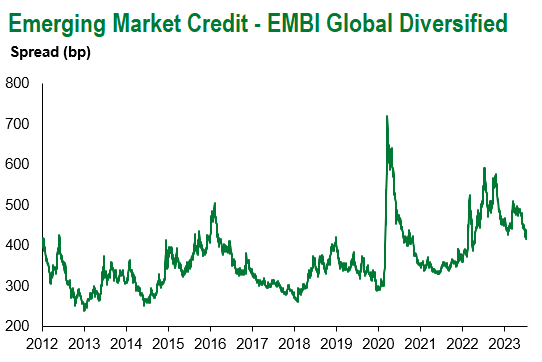
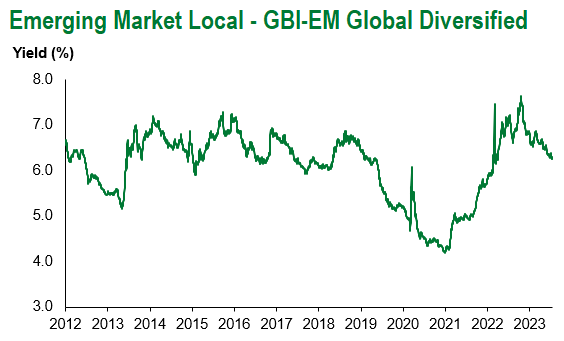
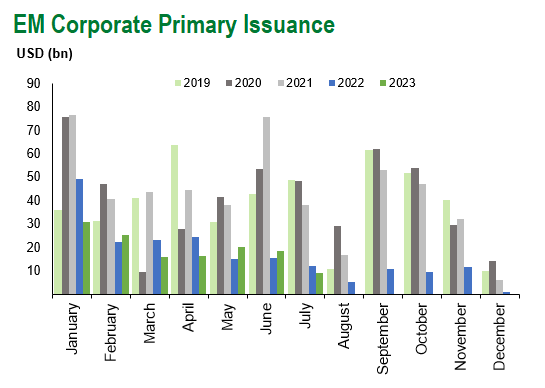
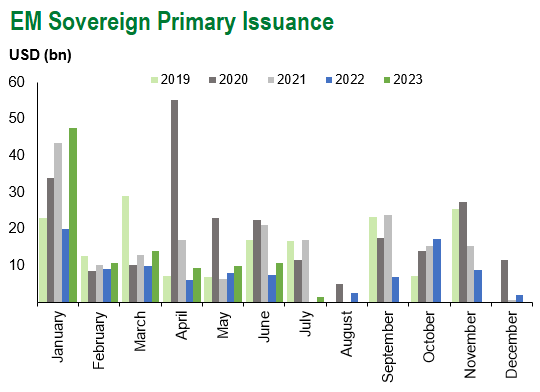
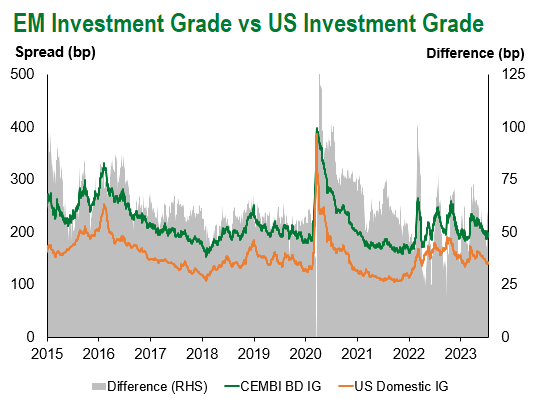
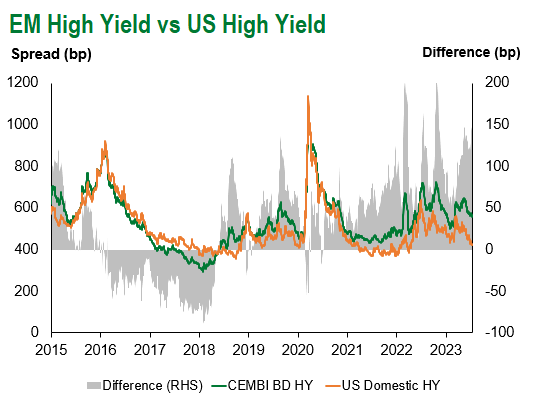
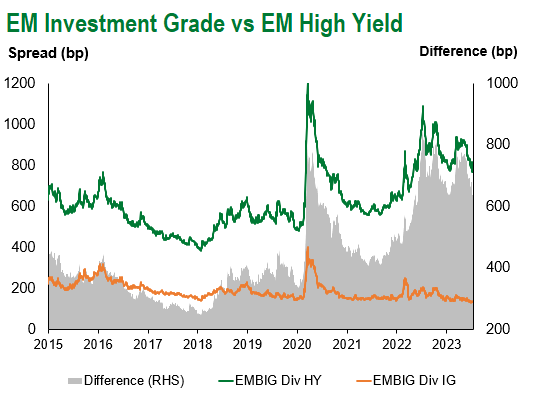
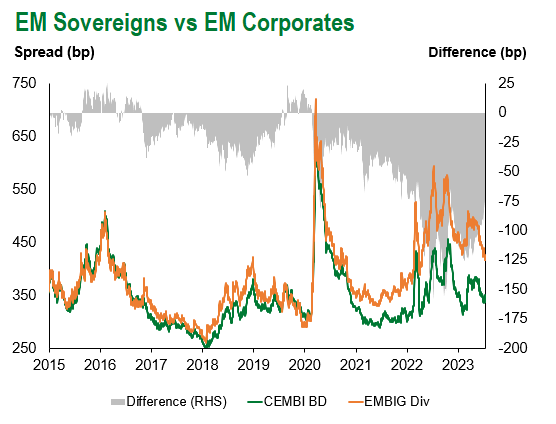
Emerging Markets Flows
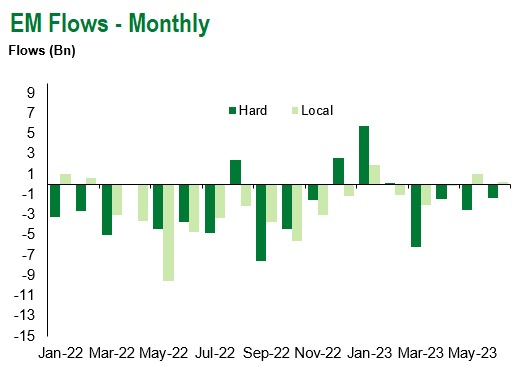
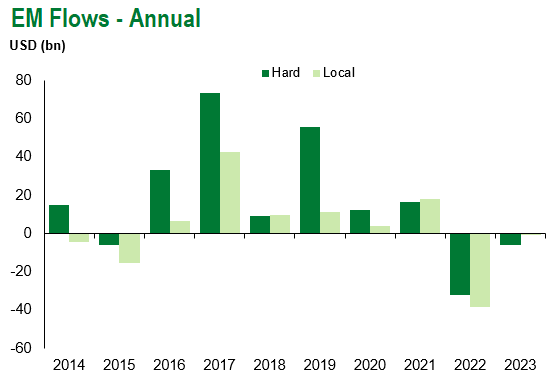
Source for graphs: Bloomberg, JPMorgan, Gramercy. As of July 21, 2023.
For questions, please contact:
Kathryn Exum, CFA ESG, Director, Co-Head of Sovereign Research, [email protected]
Petar Atanasov, Director, Co-Head of Sovereign Research, [email protected]
James Barry, Director, Deputy Portfolio Manager, [email protected]
This document is for informational purposes only. The information presented is not intended to be relied upon as a forecast, research or investment advice, and is not a recommendation, offer or solicitation to buy or sell any securities or to adopt any investment strategy. Gramercy may have current investment positions in the securities or sovereigns mentioned above. The information and opinions contained in this paper are as of the date of initial publication, derived from proprietary and nonproprietary sources deemed by Gramercy to be reliable, are not necessarily all-inclusive and are not guaranteed as to accuracy. This paper may contain “forward-looking” information that is not purely historical in nature. Such information may include, among other things, projections and forecasts. There is no guarantee that any forecasts made will come to pass. Reliance upon information in this paper is at the sole discretion of the reader. You should not rely on this presentation as the basis upon which to make an investment decision. Investment involves risk. There can be no assurance that investment objectives will be achieved. Investors must be prepared to bear the risk of a total loss of their investment. These risks are often heightened for investments in emerging/developing markets or smaller capital markets. International investing involves risks, including risks related to foreign currency, limited liquidity, less government regulation, and the possibility of substantial volatility due to adverse political, economic or other developments. References to any indices are for informational and general comparative purposes only. The performance data of various indices mentioned in this update are updated and released on a periodic basis before finalization. The performance data of various indices presented herein was current as of the date of the presentation. Please refer to data returns of the separate indices if you desire additional or updated information. Indices are unmanaged, and their performance results do not reflect the impact of fees, expenses, or taxes that may be incurred through an investment with Gramercy. Returns for indices assume dividend reinvestment. An investment cannot be made directly in an index. Accordingly, comparing results shown to those of such indices may be of limited use. The information provided herein is neither tax nor legal advice. Investors should speak to their tax professional for specific information regarding their tax situation.
